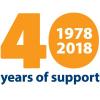As part of Sands 40th anniversary this year, we will share 40 stories by 40 parents, family members and friends affected by the death of a baby. Starting in June to coincide with Sands Awareness Month and our #FindingTheWords campaign, we aim to show the sheer number of people who are affected by the tragedy of a baby’s death, help other bereaved parents to understand they are not alone and raise awareness of the issues surrounding stillbirth and neonatal death. Visit our 40 stories for #Sands40 to view other blogs in the series.
I’ve never been really good at remembering dates. It’s people I remember. Or more accurately voices. I’ve heard a lot of voices on the Sands helpline, on a call or written in an email. And always, the fragile voices of grief.
I’m not sure I helped always, but I’ve always tried to; to keep learning how to listen, to keep meaning my heart. That feeling has never changed.
I think we all feel that way on the helpline, as it is a very special and profound space we all serve. And I see that reflected throughout the whole of Sands. It moves me intensely and my admiration for others passion and desire to help is beyond a measurement of words.
I came to Sands almost 20 years ago now, which puts me at about halfway of the 40 years the charity has been in existence.
I had had a late miscarriage and an earlier loss, and after an incredibly fraught but successful pregnancy later, I came across a small advert from the Sands charity looking for volunteers on a helpline and I just knew I had to put myself forward.
When I arrived, Sands was then in the glorified attic space of a large five storey Georgian building in Portland Place near Oxford Street in central London, our current HQ predecessor of only a few years ago. It was a very small set up and you could count the staff on almost one hand.
The helpline physically has moved a lot too. We built a soundproof helpline room within the main office and finally moved from this set up altogether to home working. This was partly due to practicalities of space and partly to reflect ourselves as a national charity with local groups.
Sands has changed so much in that time but in many ways the helpline has stayed the same. Grief is grief across time.
For me, to speak openly and honestly about grief, to recognise that devastating impact on a life is everything our support services, one of our three aims, tries to achieve at Sands.
But what has changed?
Size with a capital S. And with that growth has come grown visibility as a charity and everything we have achieved out of that increased visibility and stature. It’s really wonderful to see that. Also, as part of that old smaller team. It feels less lonely somehow.
The Sands support groups were there 20 years ago and they are superstars to me; in many ways, what is Sands without them? But what is Sands without any of us? We are truly a connected organisation of care and motivation; all believing in our core aims; trying to promote and provide care, awareness and ultimately prevention.
The other major change is of course the internet. The first call I took was on a landline, now, although the same motion of picking up a phone, it is a VoIP phone. Instead of heart-breaking handwritten letters received seeking support, now people reach out to us through the internet and emails now flood in all times of day to the helpline.
The heartbreak is the same. When a helpline worker sits down next to their phone, they now open a laptop to support, signpost and connect via the internet. Email has enabled us to not only communicate with each other but has radically opened up options of choice of support to anyone seeking it for themselves or another through the helpline.
Back in the day, we had huge cumbersome files of printed other organisations. Now within half a minute we can look up and signpost to a myriad of other support organisations. That is without doubt the big change for the helpline.
That is of course true in all our lives at Sands; from social media, the online community and how we interconnect, but it is worth thinking of that time when the internet actually didn’t exist for us as an organisation.
So what we offer is the same. A caring and gentle compassionate space to really try listen to those in their most heart-breaking of times. How we offer that with more choice through technology has changed and will keep evolving to hopefully offer new choices of support.
We are not a big helpline but a small and dedicated one. In that 20 years, we have collectively easily reached over 100,000 people who have been affected by the death of a baby.
15 babies die before, during or shortly after birth every day in the UK. We want to reduce this number, but we need your help. Support #FindingTheWords initiative now to help ensure a bereaved parent doesn't have to cope alone. Thank you.

